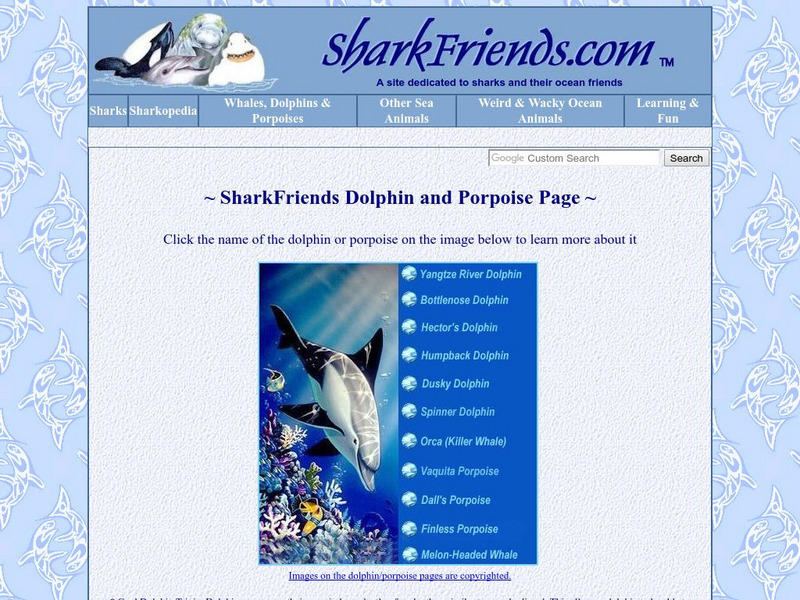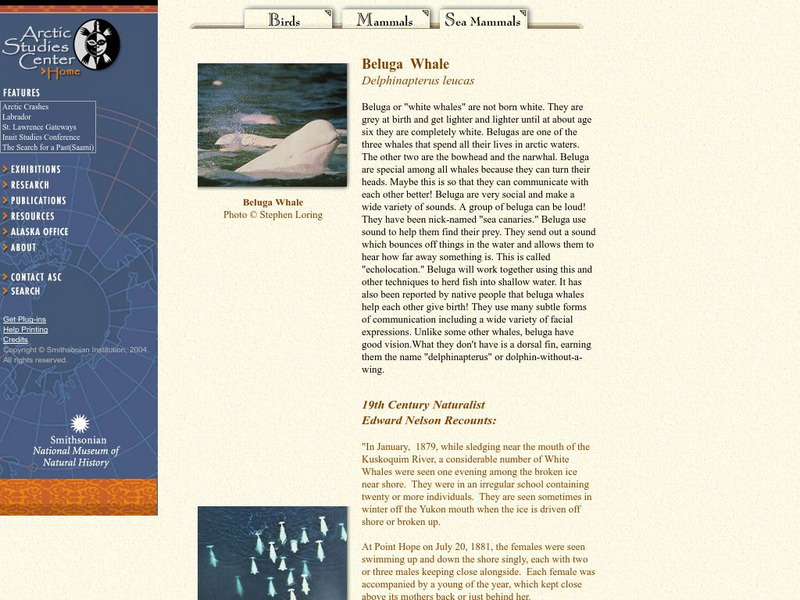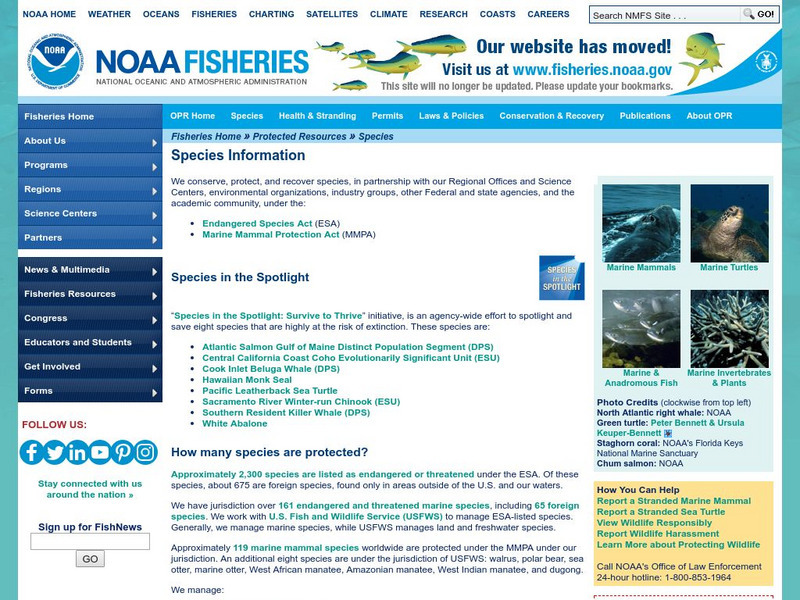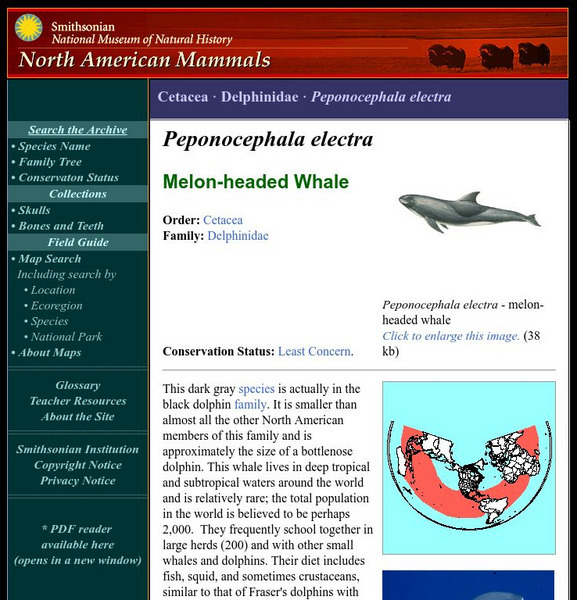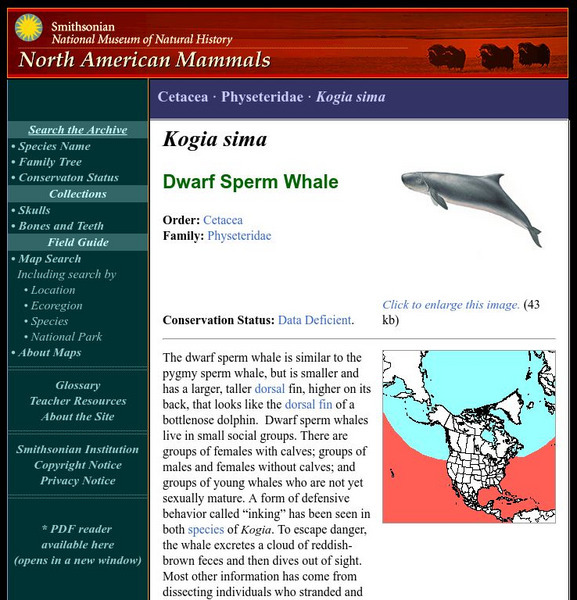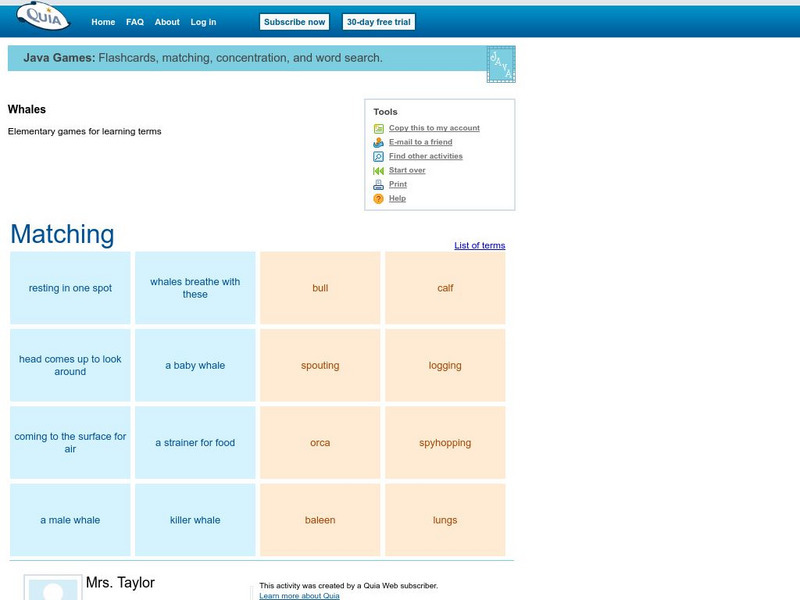MarineBio Conservation Society
Marine Bio: White Beaked Dolphin
Illustrated reference guide features useful information on white-beaked dolphins with facts on physical characteristics, behavior, range, habitat, diet, and conservation status.
TED Talks
Ted: Ted Ed: How Smart Are Dolphins?
Lori Marino details some incredible facts about dolphins nad their intelligence. [4:51]
MarineBio Conservation Society
Marine Bio: Indo Pacific Hump Backed Dolphins
Illustrated reference guide features useful information on the Indo-Pacific hump-backed dolphin with facts on physical characteristics, behavior, range, habitat, diet, and conservation status.
MarineBio Conservation Society
Marine Bio: Amazon River Dolphin
Discover useful information about Amazon river dolphins including description, behavior, range, habitat, diet, breeding, and conservation status.
A-Z Animals
A Z Animals: Animal Facts: Killer Whale (Orcinus Orca)
Investigate the world of the Killer Whale and discover information on the appearance, behaviour, habitat, and conservation status of the biggest member of the dolphin family. Includes images and statistics.
Ducksters
Ducksters: Dolphins
Kids learn how dolphins eat, sleep, and live together. Bottlenose dolphins and orcas travel the ocean in pods.
Other
Shark Friends Dolphin and Porpoise Page
Dive down deep with these adorable sea creatures and users discover more about them. Includes information on all different types such as the Humpback, Orca, Spinner and many more!
Smithsonian Institution
Kids'castle: The Tail of the Whale
A great article abstract about Orca whales. Use this site to learn how whales travel great distances, and about the personal struggle of one baby orca.
BBC
Bbc Nature: Whales, Dolphins and Porpoises
Whales, dolphins, and porpoises belong to the order Cetacea. These are aquatic mammals that have streamlined bodies highly evolved for swimming. Learn more about whales, dolphins, and porpoises in this well-constructed overview produced...
Other
The Dolphin Institute: For Kids!
Great interactive site for elementary and middle school students. Learn about the order cetaceans, mysticetes, odontocetes, (baleen whales and toothed whales) and bottlenose dolphins. Then play some interactive games after learning about...
Smithsonian Institution
National Museum of Natural History: Beluga Whale
This site provides a general overview of the Beluga Whale, complete with the personal observations of 19th Century Naturalist, Edward Nelson.
Scholastic
Scholastic News: Swimming With Whales
A group of whales was recently discovered to be swimming with a dolphin, who appears to be accepted as part of the group. This is a rare activity for whales.
NOAA
Noaa: Fisheries: Cetaceans: Whales, Dolphins, and Porpoises
Learn more about the marine mammal group of cetaceans. Take a look at their status on the Endangered list and find out what situations put them on that list.
Other
Whalenet: Home Page
An interacive educational website wich focuses on whales and marine research. There are special links for students, teachers, and the general public. Learn about certain whales, go on a tour, and more.
Defenders of Wildlife
Defenders of Wildlife: Humpback Whales
This concise site looks at the size, population, lifespan, habitat, range, and diet of the humpback whale.
Mocomi & Anibrain Digital Technologies
Mocomi: Dolphin Facts
Provides general facts about dolphins including communication, types, and other unique characteristics.
Royal British Colombia Museum (Canada)
Kids Page: Whales [Pdf]
An activity handout for students on the topic of the varied species of whales, dolphins and porpoises found in British Columbia. The handout is in PDF format.
Society for Science and the Public
Science News for Students: Sleepless at Sea
Can you go for a month without sleeping? Most mammals can't, but scientists have found some marine mammals that do. Find out why some orcas and dolphins don't sleep for weeks at a time.
Smithsonian Institution
National Museum of Natural History: American Mammals: Northern Right Whale Dolphin
With no dorsal fin, a slender body shape that tapers steadily toward the tail, and small flippers and flukes, the northern right whale dolphin appears to be built for speed. It has been clocked at 34 km per hour and can dive as deep as...
Science4Fun
Science4 Fun: Dolphins
Learn about the appearance, diet, habitat, conservation status, and other fun facts about this playful marine mammal.
Smithsonian Institution
National Museum of Natural History: American Mammals: Melon Headed Whale
This dark gray species is actually in the black dolphin family. It is smaller than almost all the other North American members of this family and is approximately the size of a bottlenose dolphin. Learn more about the Peponocephala...
Smithsonian Institution
National Museum of Natural History: American Mammals: Dwarf Sperm Whale
The dwarf sperm whale is similar to the pygmy sperm whale, but is smaller and has a larger, taller dorsal fin, higher on its back, that looks like the dorsal fin of a bottlenose dolphin. Dwarf sperm whales live in small social groups....
Quia
Quia: Whales Elementary Games for Learning Terms
Match the squares and learn key whale terms. Fun with immediate feedback.
Smithsonian Institution
National Museum of Natural History: American Mammals: Sei Whale
Unlike other rorquals, Sei whales have a dolphin-like dorsal fin. They are also unusual in using two different methods to fill their mouths with water during feeding - they both gulp and skim-feed. Learn more about the Balaenoptera...






